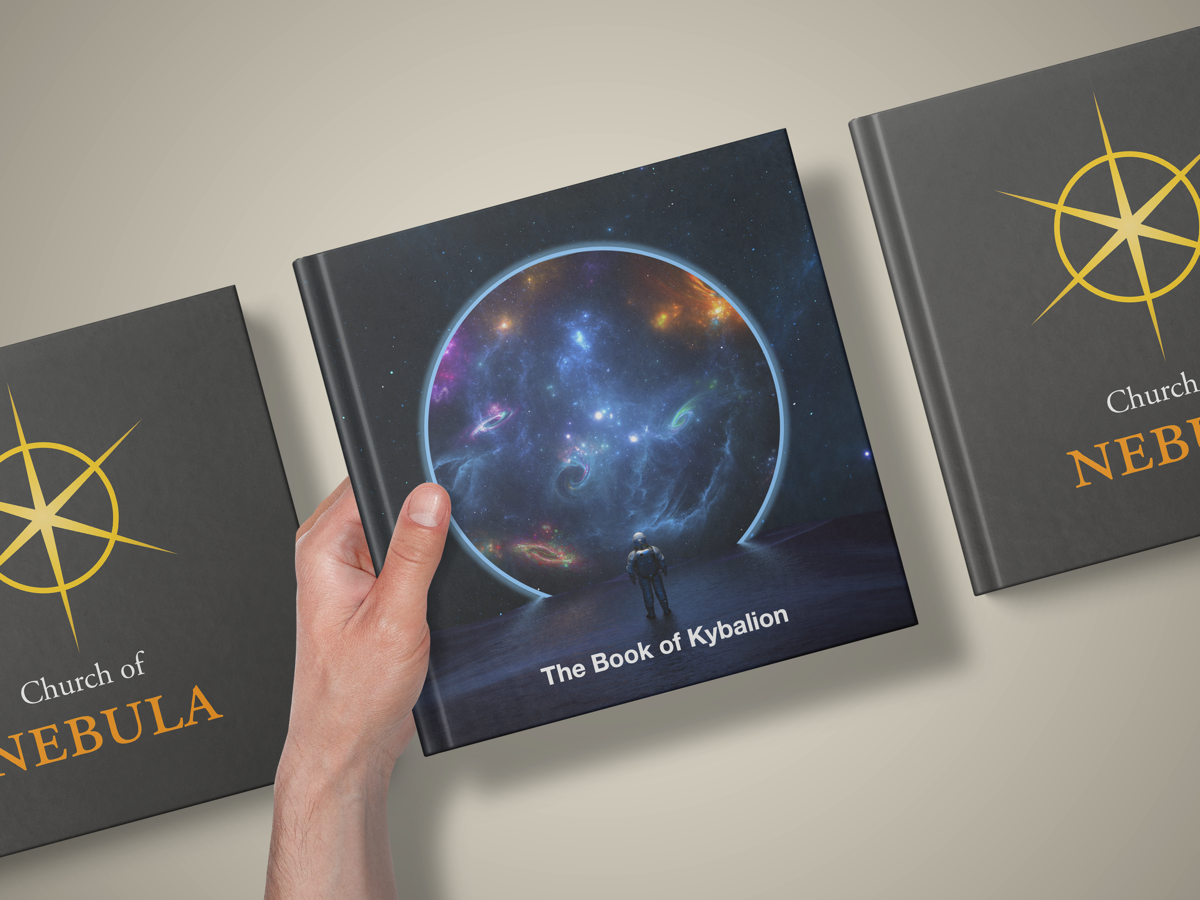
The Nebula Doctrine
In the Church of Nebula, our doctrine centers on a transformative belief: the universe is a living, breathing entity, marked by a dynamic energy that interconnects all forms of life. This fundamental understanding shapes our view of existence, aligning us with the rhythm of a cosmos that is ever-evolving, ever-changing.
We recognize that this universal energy manifests through four primary dimensions: physical, mental, emotional, and spiritual. These are not separate entities but deeply interconnected facets of existence, each contributing to the cosmic tapestry. Within this framework, we see a divine spark within all living beings, a testament to the potential for achieving heightened states of consciousness and understanding. This recognition of the divine within calls for a deep respect for life in all its forms, encouraging a stance of care and reverence.
At the core of the Church of Nebula’s doctrine is a call to explore the sacredness of life and to awaken to the mysteries of the universe. Through this exploration, we are invited to embrace our role as part of a greater whole, fostering a deep sense of unity and purpose. This journey offers not only a deeper understanding of the cosmos but also a pathway to personal and collective transformation.

Energy
The universal force that controls the entire universe. This entity is called ‘Zella’.

Gates of Hell
The three gates to the self-destructive hell: lust, anger, and greed. Renounce these three.

Karma
No one who does good work will ever come to a bad end, either here or in the world to come.

Maya
The entire universe is a dream, an illusion (simulation).

Duty
Do your duty with discipline and devotion.

Soul
The Soul is reborn based on your karmic actions.

Charity
Helping the poor and needy. Always do it with the welfare of others in mind.

This is a fantastic book and pretty much explains what is wrong with our so called modern society!
Gates of Hell
The concept of the "Gates of Hell," poetically termed as the "Doorway to Disaster," stands as a profound caution within the spiritual discourse of the Bhagavad Gita, an esteemed scripture in Hindu philosophy. This metaphorical framework identifies lust, anger, and greed as the three catastrophic portals that lead beings towards moral and spiritual degradation, marking them as the roots of all human suffering and self-destructive tendencies. The wisdom of the Bhagavad Gita illuminates the path away from these gates, suggesting renunciation as the means for liberation.
Lust, within this context, transcends mere sexual desire, encompassing a broader spectrum of unbridled cravings for physical pleasure and gratification. It represents an obsessive pursuit of sensory satisfaction, often at the expense of ethical considerations and spiritual growth. This gate tempts individuals with the illusion of happiness through external pleasures, diverting them from the inward journey towards lasting contentment.
Anger, the second gate, is characterized by intense feelings of hostility and displeasure. It arises from unmet expectations, perceived injustices, or threats to one's ego or possessions. Anger disrupts the mind's tranquility, leading to clouded judgments and actions that often exacerbate suffering for oneself and others. It acts as a formidable barrier to understanding and compassion, essential qualities for spiritual advancement.
Greed, the final gate, epitomizes the insatiable desire to accumulate more wealth, power, or possessions than necessary. It is fueled by a deep-seated sense of lack or insecurity, leading individuals to prioritize material gain over spiritual values. Greed blinds the soul to the abundance of the present moment and to the interconnectedness of all life, fostering isolation instead of unity.
The Bhagavad Gita's counsel to renounce these three destructive forces suggests a path of conscious self-regulation and spiritual discipline. Renunciation does not imply a life devoid of pleasure, ambition, or possessions; rather, it calls for a disciplined approach to life's worldly aspects, ensuring they do not overshadow one's spiritual objectives. By recognizing the transient nature of external gratifications and redirecting focus towards righteousness, truth, and contentment, individuals can navigate away from the gates of hell towards liberation.
Achieving this state of transcendence requires vigilant self-awareness and a commitment to spiritual practices that foster inner peace and purity. Through meditation, selfless service, and devotion, one cultivates the qualities necessary to withstand the allure of lust, anger, and greed. This process of inner transformation leads to a profound understanding of the self and the universe, unveiling the intrinsic joy and freedom that lie beyond the gates of hell.

Energy
Spiritual energy, often regarded as the quintessence of the universe, permeates every aspect of our existence. This divine essence is celebrated as the wellspring of limitless creative power, a source of profound healing, and the pillar upon which our spiritual evolution rests. It is this mystical force that binds the fabric of the universe together, connecting all forms of life and matter in an intricate dance of existence.
At the heart of spiritual practices across various traditions lies the belief that this universal energy is not only omnipresent but also accessible to humanity. Individuals are thought to possess the innate capability to attune themselves to this cosmic energy, thereby unlocking potential for transformative growth, healing, and enlightenment. The journey toward harnessing this spiritual energy often begins with the individual's quest for deeper self-awareness and a longing to connect with something greater than themselves.
Meditation, mindfulness, and prayer serve as conduits through which we can forge a profound connection with the universe's spiritual energy. These practices invite stillness and introspection, allowing us to peel away the layers of our worldly existence and tap into our higher consciousness. In these moments of deep communion, the veils between the physical and spiritual realms thin, enabling us to draw upon the universe's boundless energy. This connection is not exclusive or reserved for the few; it is a universal birthright, accessible to all who seek it with an open heart and genuine intent.
Embarking on this spiritual journey opens up myriad possibilities for personal transformation. By aligning our energy with the divine essence of the universe, we can begin to manifest our deepest intentions and desires, turning thoughts and dreams into reality. This process, however, is not merely about achieving personal gains; it is an opportunity to contribute positively to the world around us. The spiritual energy of the universe, when channeled with purpose and love, holds the power to heal—both ourselves and others—and to catalyze profound change and growth.
The act of tapping into the spiritual energy of the universe also paves the way for enlightenment, a state of being wherein we recognize our intrinsic oneness with all that exists. In this heightened state of consciousness, the illusions of separation dissolve, revealing the underlying unity of the cosmos. We come to understand that by nurturing our connection to the universe's energy, we not only elevate ourselves but also contribute to the collective elevation of humanity.
Accessing and utilizing the spiritual energy of the universe is a sacred journey of discovery, healing, and unity. It invites us to explore the depths of our being, to transcend the limitations of our physical existence, and to embrace the infinite possibilities that arise from aligning with the divine. In doing so, we open ourselves to a life enriched with purpose, harmony, and profound spiritual fulfillment.

Karma
Karma, a pivotal concept ingrained in various religions and spiritual traditions, functions as a universal principle governing the moral compass of the universe. It encapsulates the profound truth that every action undertaken by an individual casts ripples through the fabric of existence, setting in motion a chain of cause and effect. This invisible, yet inexorable, law ensures that every choice, every deed—no matter how insignificant it might seem—carries with it a consequence that aligns with the nature of the action itself.
At its core, karma serves as a cosmic ledger, a metaphysical accounting of one's deeds, where actions are neither arbitrarily rewarded nor punished but are instead met with outcomes that directly correspond to their inherent qualities. This system of moral causality champions the notion of ethical responsibility, positing that positive, virtuous actions foster beneficial outcomes, while negative, harmful behaviors invite adverse effects. Karma, therefore, is not punitive but educative, aiming not to condemn but to guide individuals towards self-improvement and ethical living.
Viewed through the lens of justice, karma embodies the principles of fairness and balance. It reassures individuals that the universe operates on a foundation of moral order, where good deeds do not go unrecognized and wrongdoing does not go unchecked. This cosmic equilibrium assures us that, in the grand scheme of existence, there is an inherent accountability that transcends human-made legal systems and societal norms.
The concept of karma also cultivates mindfulness and ethical deliberation. It encourages individuals to reflect on their actions, to consider the short-term and long-term effects of their choices, and to act with compassion and wisdom. In doing so, it fosters a collective consciousness that prioritizes harmony, benevolence, and the welfare of all beings. This emphasis on ethical conduct and the pursuit of goodness not only cultivates individual virtue but also contributes to the betterment of society as a whole.
Furthermore, karma underscores the interconnectedness of all life. It reveals how individual actions can influence the broader web of existence, reminding us that we are part of a larger, intricate system where our choices impact not just our own lives but also those around us and the environment we inhabit. This realization fosters a sense of communal responsibility and solidarity, prompting us to act with consideration for the well-being of others and the planet.
In essence, karma is a profound reminder of the power of our actions and the importance of living a life anchored in ethical principles. It is a guiding force that encourages us to navigate the complexities of life with integrity, compassion, and a deep awareness of the consequences of our actions. As such, karma not only shapes our individual destinies but also molds the collective fate of humanity, steering us towards a more just, harmonious, and enlightened existence.

Soul
The intertwining concepts of karma and the soul present a rich tapestry of philosophical thought that explores the nature of human existence, moral responsibility, and the journey towards spiritual liberation. At the heart of this exploration lies the acknowledgment of the soul as an enduring entity, navigating through the successive cycles of birth, life, and death, carrying with it the indelible marks of its actions.
Karma, in its essence, acts as the moral axis around which the wheel of life spins, positing that every action a person undertakes has consequential force, shaping not only their current existence but also influencing their journey in future incarnations. It underscores the profound belief that individuals wield the power to sculpt their destiny through the choices they make and the deeds they perform. This cyclical process of cause and effect, of actions and their repercussions, serves as a cosmic mechanism that ensures moral balance is maintained across the expanse of time and existence.
Integral to this process is the role of the soul, viewed as the carrier of one's karmic ledger through the layers of life. Unlike the temporal and perishable nature of the physical body, the soul is seen as immutable and eternal, transcending the constraints of individual lifetimes. It is through this spiritual vessel that the essence of a person—their virtues and vices, deeds and misdeeds—traverses the continuum of lifetimes, each incarnation shaped by the karmic inheritance of the past and, in turn, laying the foundation for future existences.
Reincarnation emerges from this framework as a fundamental doctrine, portraying life as a series of learning experiences, each governed by the laws of karma. According to this belief, the soul's rebirth into new physical forms across different lifetimes is intrinsically tied to the accumulation and resolution of karmic debt. Life then becomes a journey of evolution, with the soul's ultimate aim being the attainment of enlightenment—a state in which it transcends the cycle of karma, achieving liberation from the perpetual cycle of birth and rebirth.
This liberation, often referred to as moksha or nirvana in various spiritual traditions, represents the culmination of the soul's journey. It is a state of ultimate wisdom and inner peace, where the soul, having resolved its karmic debts and embraced a path of righteousness, unites with the divine, breaking free from the constraints of material existence and the cycle of karma.
In this philosophical and spiritual context, the notions of karma and the soul encourage a reflective and purposeful approach to life. They remind individuals of their intrinsic power to influence their spiritual trajectory and underscore the importance of living with intention, compassion, and moral integrity. By acknowledging the enduring nature of the soul and its entanglement with the laws of karma, one is invited to consider the deeper implications of their actions, not just for the present life but for the eternal journey of the soul towards enlightenment and liberation.

Duty
The concept of duty, when underscored by the virtues of discipline and devotion, transforms the act of fulfilling responsibilities into a deeply meaningful endeavor. This approach to duty is not merely about ticking off tasks from a checklist; it embodies a profound commitment to executing one's role with an unwavering sense of purpose and an earnest striving for excellence. To engage in one's duties with discipline and devotion is to recognize the significance of each action, no matter how small or routine it may appear, understanding its contribution to a greater whole.
Discipline, in this context, serves as the foundation upon which the fulfillment of duty is built. It is the inner strength that motivates an individual to persist in their tasks, even in the face of challenges or monotony. Discipline ensures that one remains steadfast and focused, enabling the consistent delivery of high-quality work. It is about cultivating self-control and a work ethic that prioritizes the needs of the task at hand over personal convenience.
Devotion adds another layer to this practice, infusing one's efforts with a sense of reverence and deep engagement. It is about connecting with the work on an emotional level, allowing passion and a genuine sense of care to drive one's actions. Devotion elevates duty from an obligation to a purposeful pursuit, marked by an enthusiasm to contribute positively and make a difference. It is this heartfelt commitment that breathes life into the work, making the process as rewarding as the outcomes.
Together, discipline and devotion ensure that the execution of duty goes beyond mere compliance. They foster an environment where accountability is embraced, not as a burden, but as an opportunity to demonstrate integrity and reliability. Such an approach to duty cultivates trust within teams and organizations, as each member proves to be dependable and dedicated to their roles.
Moreover, embodying discipline and devotion in one's duties invariably leads to professional growth and personal fulfillment. It sets a standard of excellence that inspires others, creating a ripple effect that elevates the performance and morale of the entire team or community. The positive work environment that emerges from such collective endeavor is characterized by mutual respect, constructive collaboration, and a shared commitment to achieving goals.
In essence, approaching duty with discipline and devotion is about recognizing the intrinsic value and potential impact of one's work. It acknowledges that each task, no matter the scale, fits into a larger mosaic, contributing to the success and well-being of the collective. This perspective transforms the daily grind into a meaningful journey, where integrity, excellence, and genuine care are the guiding principles, ultimately leading to both individual fulfillment and the greater good.
The Bhagavad Gita, one of the revered scriptures in Hinduism, provides profound insights into duty (dharma), highlighting its significance in life's spiritual and moral journey. A poignant quote from the Bhagavad Gita that underscores the essence of performing one's duty with discipline and devotion is found in Chapter 2, Verse 47 (2.47):
"Your right is to work only, but never to its fruits. Let not the fruits of action be your motive, nor let your attachment be to inaction."
This verse encapsulates the ethos of performing one's duty without attachment to the outcomes. It teaches the importance of dedicating oneself to one's responsibilities, focusing on the action rather than the rewards it might bring. The message conveyed is a call to engage in one's duties with a sense of selflessness, discipline, and devotion, embodying the principle of "Nishkama Karma" or action without desire for the fruits of the action.
By advocating for action devoid of attachment to results, the Bhagavad Gita encourages individuals to work with integrity, excellence, and a deep sense of commitment to the task at hand. It fosters an understanding that the true value of duty lies in the act of doing it with utmost sincerity and dedication, rather than the external success or recognition it might garner.
In essence, this teaching from the Bhagavad Gita serves as a timeless guide for how to approach one's duties and responsibilities, urging us to cultivate a mindset that finds fulfillment in the act of performing our duties to the best of our abilities, with discipline and devotion, while leaving the outcomes in the hands of the divine. It is a principle that not only elevates the quality of one's work but also contributes to personal growth and spiritual advancement.

Maya
The concept of Maya, as explored in various spiritual and philosophical traditions, portrays the universe as an intricate canvas of illusion, weaving the fabric of reality into a complex tapestry that appears tangible to our senses. In this view, the physical universe, with its vast expanse from the minuscule atom to the colossal star, is perceived as a grand spectacle—an elaborate illusion or Maya that captivates the observer into believing in the materiality and separateness of existence.
Maya suggests that every experience we undergo, every thought that flits through our mind, and every emotion that stirs within us, is part of this elaborate illusion. It posits that what we consider to be real—the physical world and our experiences in it—is akin to a dream or a simulation playing out within an infinite field of energy. This perspective challenges our conventional understanding of reality, urging us to question the very foundation of our perceptions, beliefs, and the empirical world we navigate.
Within this illusion, the laws that govern our perceived reality, such as the principles of physics—gravity, thermodynamics, and relativity—are seen as constructs that uphold the semblance of a structured and predictable universe. These laws, while offering explanations and a sense of order within the confines of the physical realm, are also enveloped by the veil of Maya, contributing to the grand illusion that pervades our understanding of existence.
Moreover, the notion of Maya extends to the very concepts of time and space—elements fundamental to our understanding of the universe. Under the spell of Maya, time is perceived as a linear sequence of events, and space as the vast container in which all matter exists. However, within the philosophical inquiry into the nature of Maya, both time and space are transcended, revealed to be mere abstractions rather than absolute realities. They are part of the illusion, serving to structure and differentiate experiences within the cosmic play.
The contemplation of Maya invites us into a profound exploration of consciousness and the nature of existence. It beckons us to look beyond the apparent reality, to discern the underlying unity of all creation, and to recognize that the diversity and multiplicity of the universe stem from a singular source. This realization carries with it the potential for spiritual awakening, as it shifts the seeker's perspective from one of separation and materiality to one of oneness and interconnectedness.
Understanding Maya does not negate the value or beauty of the physical universe and our experiences within it. Instead, it offers a deeper appreciation of life as a divine play of consciousness, encouraging us to live with awareness, compassion, and a sense of wonder. In recognizing the illusionary nature of existence, we are invited to engage with the world in a more meaningful way, cherishing the ephemeral beauty of the cosmic dance while remaining anchored in the eternal essence that lies beyond Maya.

Charity
Charity, woven deeply into the fabric of spiritual life, transcends mere acts of giving; it embodies a profound expression of compassion, empathy, and connectedness with the human family. Grounded in the principle of generosity, charity is not only viewed as a moral and ethical duty but also as a vibrant manifestation of the human spirit's capacity for kindness. It is a tangible demonstration of love in action, often considered a divine imperative across numerous religious traditions.
At its core, charity encompasses much more than the mere transfer of material resources from those who have to those who need. It involves a heartfelt offering of oneself — be it through time, effort, expertise, or emotional support — to alleviate suffering, bring comfort, and uplift the lives of others. The essence of charity lies in the intention behind the act, a willingness to place the wellbeing of others above one's own interests without expectation of reward or recognition.
In many spiritual traditions, charity is intricately linked to the concept of worship and communion with the divine. It is perceived not merely as an act of human kindness but as a sacred duty, a way of honoring the divine presence that resides within every individual. Through acts of charity, one acknowledges the sanctity of life and the interconnectedness of all beings, seeing the act of giving as a pathway to spiritual growth and enlightenment.
Charity also serves as a reflection of one's faith in a higher power, a testament to the belief in the inherent goodness and dignity of every soul. Many religions advocate for charitable giving and selfless service as essential practices, encouraging devotees to share their blessings with those in need. This act of giving is often seen as a means of purifying one's wealth, fostering a spirit of gratitude, and acknowledging the temporal nature of material possessions.
Furthermore, charity acts as a catalyst for social cohesion and unity, bridging the divides of race, religion, and nationality. It embodies the universal values of love, compassion, and empathy, promoting a sense of global brotherhood. By extending a hand of support to those in need, individuals and communities come together, weaving a tapestry of hope and solidarity that transcends borders and cultural barriers.
In essence, charity is much more than a spiritual duty; it is a profound expression of the human capacity for empathy and altruism. It invites individuals to look beyond themselves, to recognize the struggles of others, and to engage in acts of kindness that elevate both the giver and the recipient. As a form of worship and a testament to one's faith, charity enriches the spiritual journey, drawing one closer to the divine and to the core of what it means to be truly human.

